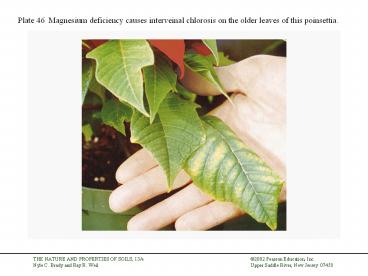Plate 46 - PowerPoint PPT Presentation
1 / 20
Title:
Plate 46
Description:
... Sea spray has caused salt injury (brown leaves) despite the high salt tolerance of this Bermuda grass at Pebble Beach Golf Course in California. – PowerPoint PPT presentation
Number of Views:92
Avg rating:3.0/5.0
Title: Plate 46
1
Plate 46 Magnesium deficiency causes interveinal
chlorosis on the older leaves of this poinsettia.
2
Plate 47 Phosphorus deficiency causes severe
stunting and purpling of older leaves of this
tomato.
3
Plate 48 The color developed after wetting soil
with a pH-sensitive dye can be compared to a
color chart in order to estimate soil pH in the
field. This soil has a pH of about 7. See page
377.
4
Plate 49 Sulfur deficiency typically causes
chlorosis (yellowing) on the youngest leaves
first, or on all the foliage, as in the sorghum
plant on the left. This contrasts with nitrogen
deficiency, which causes chlorosis first on the
oldest leaves. Plants growing on low-sulfur soil
responded to sulfur addition.
5
Plate 50 Nitrogen-deficient corn on Udolls in
central Illinois. Ponded water after heavy rains
resulted in nitrogen loss by denitrification and
leaching.
6
Plate 51 Slow-moving coastal plain stream choked
with algal bloom caused by nitrogen and
phosphorus from upstream farmland.
7
Plate 52 Normal (left) and phosphorus-deficient
(right) corn plants. Note stunting and purple
color.
8
Plate 53 Zinc deficiency on peach tree. Note
whorl of small, misshaped leaves.
9
Plate 54 Zinc deficiency on sweet corn. Note
broad whitish bands.
10
Plate 55 Eroded calcareous soil (Ustolls) with
iron-deficient sorghum.
11
Plate 56 Boron deficiency on alfalfa. Note
reddish foliage.
12
Plate 57 Pink blooms belong to pioneering redbud
(Cercis canadensis L) trees, a nitrogen-fixing
legume that enriches the soil for the other
species (which eventually will take over as the
forest matures).
13
Plate 58 Nitrogen deficiency on a pine tree. The
yellowing (chlorosis) occurs mainly on the older
needles.
14
Plate 59 The large soybean root nodule was cut
open to show its red interior indicative of
active nitrogen fixation. The red comes from an
iron-coordinated compound very similar to the
hemoglobin that makes human blood turn red when
oxygenated.
15
Plate 60 Looking like snow, the salt crust
covering this soil formed when salt-laden
groundwater in this salt marsh near the Great
Salt Lake in Utah rose by capillarity and
evaporated from the soil surface, leaving the
dissolved salt behind.
16
Plate 61 Sea spray has caused salt injury (brown
leaves) despite the high salt tolerance of this
Bermuda grass at Pebble Beach Golf Course in
California.
17
Plate 62 Its a good thing this homeowner
readjusted his spreader before he finished
fertilizing the lawn. Salt burn from too much
nitrogen fertilizer.
18
Plate 63 Iron deficiency causes yellowing with
sharply contrasting green veins on the younger
leaves. Rose growing in soil with pH 6.8.
19
Plate 64 Stream polluted by acid drainage caused
by sulfurization of soils forming in coal mine
spoil. FeSO4 in the acid drainage oxidizes in the
stream to cause the orange color. See page 585.
20
Plate 65 Early stages of soil formation in
material dredged from Baltimore Harbor. Sulfidic
materials (black), acid drainage (orange liquid),
salt accumulations (whitish crust), and
initiation of prismatic structure (cracks) are
all evident.































